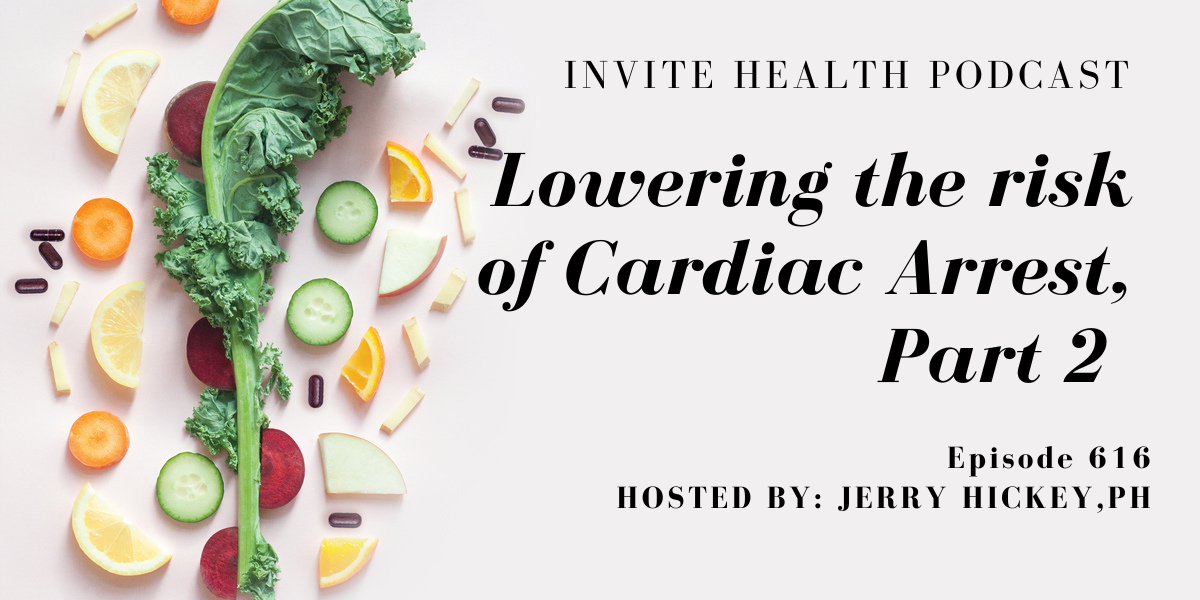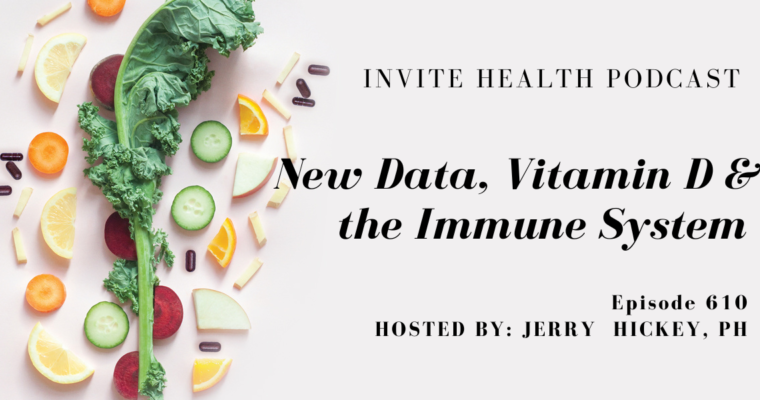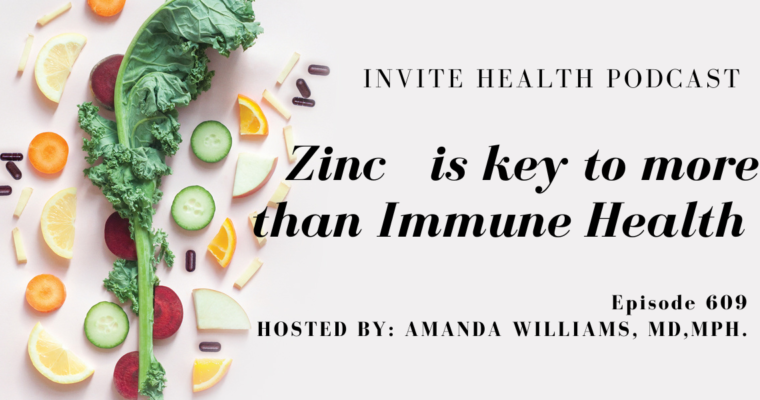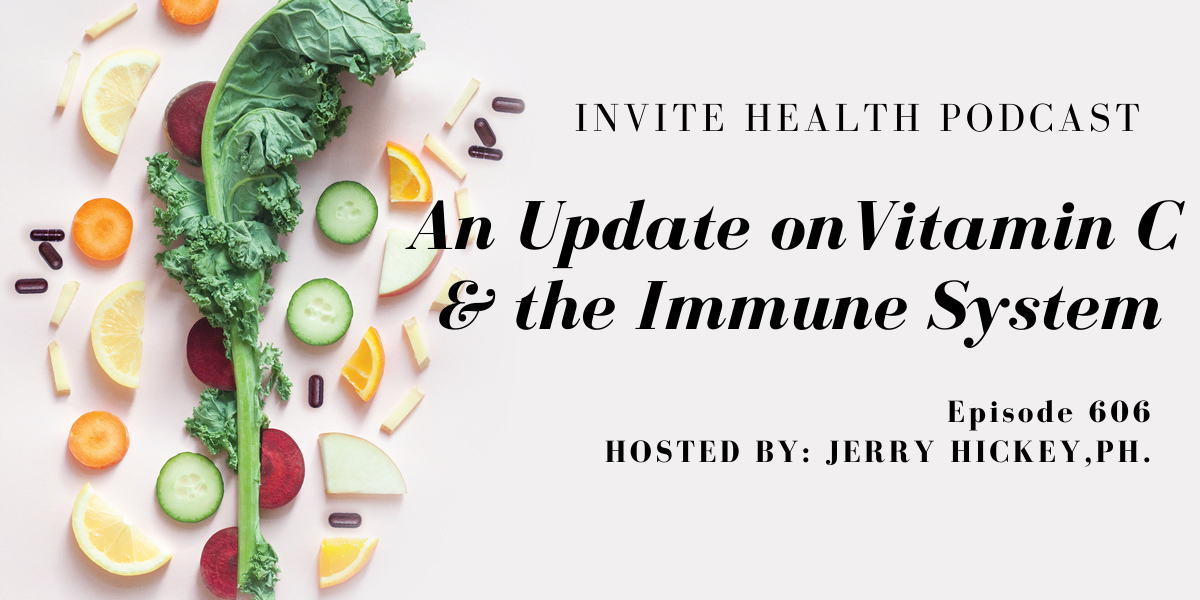Subscribe Today!
Please see below for a complete transcript of this episode.
LOWERING THE RISK OF CARDIAC ARREST, PART 2- INVITEⓇ HEALTH PODCAST, EPISODE 616
Hosted by Jerry Hickey, Ph.

*Intro Music*
InViteⓇ Health Podcast Intro:[00:00:04] Welcome to the InViteⓇ Health Podcast where our degreed health care professionals are excited to offer you the most important health and wellness information you need to make informed choices about your health. You can learn more about the products discussed in each of these episodes and all that InVite Health has to offer at, www.invitehealth.com/podcast. First time customers can use promo code podcast at checkout for an additional 15% off your first purchase. Let’s get started.† [00:00:34]
*Intro Music*
Jerry Hickey, Ph.: [00:00:40] The name of this episode, this being part two, is lowering the risk of cardiac arrest. Now, what caused me, what spurred me on to do this episode is the Buffalo Bills, Damar Hamlin had an incident during a game recently. They had to stop the game, of course, and fortunately he’s progressing. He’s coming back towards good health and you would think so, I mean, he’s a powerful young guy, extremely fit. But it struck again, cardiac arrest struck again. Lisa Marie Presley, she was only 54 and she died on January 12th, that was Elvis Presley’s daughter, hi, my name is Jerry Hickey, welcome to my episode, part two, lowering the Risk of Cardiac arrest. You can find all invited episodes for free wherever you listen to podcast or just go to invitehealth.com/podcast. You can also find invite on Instagram, Facebook and Twitter at Invite Health. And all of the information on this episode will be listed in any description.† [00:01:47]
[00:01:50] Now, cardiac arrest is an electrical problem. The heart stops beating and sadly, in the lion’s share of cases that occur outside of a hospital, it’s not survivable. It progresses of a sudden cardiac death, meaning the heart doesn’t start to beat again, it does not restart. So it’s a very atrocious number and it’s different from a heart attack. A heart attack is generally a blockage problem, but of course, it can lead to cardiac arrest and sudden cardiac death. These are horrible names. Now, the most common cause is an issue with the heart like heart failure or having had heart attacks, etc. So you can listen to part one of this episode for the statistics and for the risk factors, and I believe I laid down good evidence for fish oils protecting your heart in part one, lowering your risk of a heart attack, lowering your risk of cardiac arrest, and especially lowering your risk of sudden cardiac death. So let’s keep on going and I’m going to broaden the conversation. Are there other supplements that may have some ability to lower your risk of cardiac arrest? So here’s from the Mayo Clinic proceedings, January 2017. It’s the Epidstat institute in Ann Arbor, Maine, along with other institutions and, of course, a VA hospital in Illinois because you need the patients. But they looked at a whole bunch of studies. They looked at 18 randomized controlled trials and randomized controlled trials in patients with elevated triglycerides or elevated LDL cholesterol, and of course, many of them were on statins. Fish oils were protective from coronary heart disease risk. That’s very important because coronary heart disease is what leads to heart failure and strokes and sudden cardiac death and cardiac arrest and all these other horrible things. In a cohort study, so there were 16 prospective cohort studies and 18 randomized controlled trials looking at fish oils and the risk of a heart attack and the risk of sudden cardiac death and risk of coronary death dying from anything with the heart, the risk of angina, you know, poor blood flow to the heart, which is a killer and a cohort studies fish oils, significant decrease for the risk of any coronary heart disease event, any coronary heart disease event. Now, that could be anything from an arrhythmia to a heart attack, to cardiac arrest, to heart failure to sudden cardiac death. So Fish oils really are important. And let me just tell you something, if you’re on a statin, you need more fish oils than normal because statins deplete your fish oils, there’s less fish oils in the blood when you’re on a statin, you actually need more fish oil if you are on a statin, to make up for the part that’s dumped out by the statins, that’s depleted by the statins. It has to do with the carriers, there’s different forms of cholesterol that carry fish oils around the body, and when those levels go down, the fish oils naturally will decline also because there’s nothing left to carry them. So if you’re on a statin, you actually need additional fish oils, so that’s a really important point. Not to mention that fish oil absorption declines with age in the first place. You always want to know fish oils.† [00:05:29]
[00:05:31] So here is a pretty darn good verdict on cardiac arrest that’s published in the Journal of the American College of Cardiology, December 28, 2022. Looking at a huge, comprehensive, absolutely unbelievable, massive review on supplements and the heart. So this is a good verdict on any supplement which supplements have good evidence that they are important for the heart. They looked at 884 randomized controlled human clinical trials. Now, if this doesn’t tell you what’s important, nothing will. It was a combined total of 883,000 people, so we’re going towards a million people. That’s more people than in most cities, even major cities. So who performed this massive collation of data and and really sifting through the data and analyzing it and putting, you know, what’s real up on the board? Well, Brown University, now that’s Ivy League, Brown University’s Ivy League and Mt. Sinai Icahn School of Medicine, which is a great institution, Mount Sinai in New York City, and from what I understand, they now have a mount Sinai satellite down in West Palm Beach, right near to the bridge that goes over to Palm Beach, it’s a great place. It really is, there’s great, there’s great researchers there. There’s great doctors there. It’s very, extremely well-organized, it’s one of those New York City, incredibly organized medical centers. So it’s Brown University in Mount Sinai. And they are looking at all these different supplements and huge number of studies, a huge number of people, fish oils, folate and Ubiquinol are extremely important. So I’m going to spend a little time explaining these things. They found fish oils reduce the risk of cardiovascular disease, mortality, dying from cardiovascular disease. They reduce the risk of a heart attack. Now, they did give you figures, you know these figures, they’re not rock solid, reducing the risk of cardiovascular mortality by 7%. But you have to understand these people are already on a lot of drugs. These people are on drugs for high blood pressure, for arrhythmias, for diabetes. So they’re already on the best medicine, many of these people. Adding the fish oils furthers reducing the risk of dying from some kind of heart related disease by 7%, heart attacks by 15%. Now, that’s unbelievable. What’s more scarier than a heart attack, coronary heart disease events by 14%. This is real. I mean, this is real benefit, coronary heart disease, that’s blockages of blood vessels, so you’re reducing the risk of a stroke, heart attack, sudden cardiac death, cardiac arrest, all these different things, arrhythmias. Now, this meta analysis is conclusive, it really is conclusive.† [00:08:37]
ICYMI:LOWERING THE RISK OF CARDIAC ARREST, PART 1- INVITEⓇ HEALTH PODCAST, EPISODE 612>>LISTEN NOW!
[00:08:38] Now, let’s look at folate. I want to explain folate, we’ve done podcast episodes on folate. Folate is named after foliage because it’s a vitamin that’s ubiquitous in plants. Problem is, that doesn’t mean you can convert it into the active form, so that’s one consideration. Plus, it’s not the easiest thing to get out of the plants, there are things that get in the way with the absorption of folate. Now, a lot of companies in their multivitamins, they use a synthetic form called folic acid, which I am not a fan of, because even myself and my wife, we don’t fully convert folic acid to the active form, the active form is methyltetrahydrafolate. So you really want if you get a supplement, you want to get the MTHF form of folate or folic acid, you want to get the MTHF form, which is methyltetrahydrafolate, because for one thing it lowers homocysteine. Homocysteine in the brain is strongly connected with Alzheimer’s disease risk and homocysteine in the heart, not by itself, it needs other risks, but in the heart, along with other risks like elevated uric acid or super high blood pressure, high blood sugar, etc. is dangerous for the heart and it causes other problems too. So you want to get the methyltetrahydrafolate form of folate because that’s already active. So you know what’s going to protect you.† [00:10:00]
[00:10:02] And Ubiquinol, raising Ubiquinol in the blood lowered the risk of all cause mortality by 32%. Now, this is incredible, once again, this is based on 883,000 people from 884 randomized controlled human clinical trials. So what is so called all cause mortality, it’s very important to understand what this means. All cause mortality is dying from anything getting run over by a bus, drowning, committing suicide. But most, commonly a stroke or heart attack, Alzheimer’s disease, heart failure, infections, things of this nature. So a 32% drop in all cause mortality. But of course, if you look at the data that’s going towards all cause mortality, mostly related to the heart. So Ubiquinol is the active form of coenzyme Q10. Coenzyme Q10 is Ubiquinone, and when you swallow Ubiquinone, A, it has to be absorbed, it’s very poorly absorbed, but B, it has to be converted to Ubiquinol or Ubiquinol, depending on who you speak to, you can pronounce it either way apparently. You don’t fully convert it many times, like older people have trouble converting regular CoQ10 to Ubiquinol. Diabetics have trouble converting CoQ10 to Ubiquinol. People with chronic progressive neuromuscular conditions have trouble converting CoQ10 to Ubiquinol. So I think in a lot of people, especially diabetics and the elderly, you’re much better off opting for Ubiquinol. Ubiquinol is involved with dealing with fatigue because Ubiquinol is at the core of converting sugar into energy. So as Ubiquinol levels naturally decline with age because they will wear after a decline severely and suddenly because of diabetes you become fatigued. You have less strength, less endurance, less stamina. Research shows this, by the way, that’s another one. Besides fish oils, Ubiquinol levels are also lowered by some statins. I don’t know if all statins do it, but many statins will do it.† [00:12:14]
[00:12:16] Now, also reducing the risk of cardiovascular issues. So they found that other things reduce your risk of cardiovascular issues, some of these are found in a multivitamin. I’ll go through each one, let’s do the common ones first. Omega six fatty acids, which are vegetable oils, basically in a supplement that could be evening primrose oil, that would be omega six. A little bit of omega six is needed to balance out the omega three, the omega three is fish oils and krill oil and eating fish and eating certain seafood, omega six are more vegetable oils, but there’s a balance. You need both for your immune system, you need both for natural balance in the body of everything that goes on biologically in your body, that there should be a natural rhythm to everything, a natural balanced everything. So you need the omega three, the omega six. Problem is, most Americans get too much omega six, and that makes them violently inflamed, and this contributes to diseases such as heart disease and cancer, etc. Not that the omega six is bad, but you need the balance of omega three. So, N-6, well, that’s an abbreviation for omega six fatty acids has been shown in natural quantities, not super high quality to lower your risk of cardiovascular issues. So has a vitamin D? Well, that makes sense. I mean, vitamin D is important for regulating many things, including inflammation, and inflammation is causative of heart disease problems, cardiovascular problems. So vitamin D, Zinc? Well, yes. First of all, Zinc works with vitamin D to control your blood sugar through your pancreas. The hormones release from the pancreas to control your blood sugar so it’s not too high or too low. But Zinc is also needed to control the immune system. And without enough Zinc you become inflamed, just like lacking vitamin D, become inflamed.† [00:14:13]
[00:14:14] Magnesium. Magnesium’s amazing. Most Americans do not get enough magnesium. Magnesium, first of all, activates vitamin D, So if you’re lacking magnesium, your body doesn’t work and you become inflamed and inflammation leads to heart disease and other diseases. And I’m not talking about major inflammation like, like having a lupus or an infection of the lungs. I’m talking about low grade, chronic long term inflammation from a poor diet, lack of exercise, etc.. So if you lack magnesium, you become inflamed because you can’t activate vitamin D, and without vitamin D, you can’t control the immune system and it just goes to inflammation. But magnesium to so many other things, it also activates melatonin. Melatonin is needed for memory, melatonin is needed for the immune system. Melatonin is needed for good healthy digestive system. Melatonin is needed for your bones, melatonin is needed for you, for so many things. So that’s vitamin D, Zinc and Magnesium that you would get in a good vitamin and omega six fatty acids that you get in your food, like, you know, like sesame seeds and things like that would have omega six fatty acids.† [00:15:24]
[00:15:24] L -Citrulline, well, L- Citrulline is an amino acid and it’s very important, citrulline is an alpha amino acid. Amino acids make proteins and enzymes and hormones. Amino acids make you and make you function. Citrulline is important because one, it makes something that’s important for your muscles and strength and energy called beta hydroxy beta methyl butyrate. But Citrulline is also important for breakdown products of your muscles, Ammonia products, the body getting rid of them into urea cycle so citrulline support and so citrulline helps lower your risk of heart disease events and developing heart disease itself. Along with that is L-arginine. Now that’s interesting, L-arginine is also an alpha amino acid. L-Arginine is conditionally essential, L-Arginine helps just like Citrulline and helps build muscle, L-Arginine actually creates some Citrulline as a byproduct. L-Arginine normally creates nitric oxide and nitric oxide keeps blood flowing in the body, and nitric oxide helps fight viruses and it does a whole bunch of other things. But the major activity of nitric oxide is blood flow. It pushes up in your blood vessels. So when your heart pumps blood, the blood reach your muscles and your organs and your feet and your brain, etc. The blood vessels have to pop open, it’s the gas nitric oxide that pushes it open and arginine triggers nitric oxide synthase to create nitric oxide so you can function. So arginine has an ability to lower the risk of cardiovascular issues. Citrulline, two amino acids.† [00:17:15]
[00:17:15] Quercetin. Quercetin is very interesting. First of all, Quercetin is a Flavonoid. It’s very common in food, but even the best diet doesn’t give you a lot of it. Quercetin is something I supplement every day and I’ll tell you why in just a minute. Quercetin in foods is found in the best foods green tea, broccoli, garlic, onions, things of this nature, very healthy foods, berries, citrus fruits and quercetin in different studies is helpful with allergies, it helps you breathe. It’s helpful with blood pressure if you get enough. But you have to take a lot like 500 milligrams three times a day to help with circulation. Blood pressure stabilizes, blood vessel walls, so they function more realistically, more naturally, and as a kind of younger, healthier version of blood flow it leads to. Quercetin has some ability to reduce inflammation in the urinary tract and the prostate. I love Quercetin because it’s senolytic, there’s not many senolytics that we know of. Oh, one of them is Rapamycin, an investigational drug. It’s from Rapanui, you know, Easter Island and of a fungus, I believe and it a small amount of of rapamycin slows down the aging process and so does quercetin,so does Quercetin and it functions as a senolytic, that’s how it does that. With age, kind of we can see now cells are not getting removed the way we used to remove them. We used to have these little tweezers that remove these unhealthy cells, otherwise, they become toxic to the surrounding healthy cells. See that removing as many dead cells, etc. There are certain things like this that occur with aging. Quercetin restores the ability of an aging body to remove these kind of zombie cells to slow down the aging process. So they’re very interesting. But quercetin in and of itself lowers your risk of cardiovascular issues like like heart disease and stroke and heart attack, etc. But it always works better in conjunction with vitamin C. Melatonin has been shown to lower the risk of cardiovascular issues. Well, it does help regulate your immune system. Many immune cells actually have receptor sites for melatonin, meaning that they can’t do their job unless you express some melatonin, you release some melatonin and they come in contact with that. So melatonin very important for the immune system in a number of ways on a number of levels. And as a byproduct of that, it helps control inflammation.† [00:19:53]
[00:19:55] Curcumin, now who couldn’t guess this? There’s a plant, the curry plant, called turmeric. It gives curry, its characteristic, odor and color and flavor, etc. I happen to love curry, but I take a well absorbed turmeric every day. I take something called bio curcumin every day. For one thing, it’s great for the brain that’s been shown to really be, I’ve done one or two podcast episodes on turmeric. You know, it has curcumin, because curcumin is the most well known constituent from it. The actual name of the plant is Curcuma Longa, but the most commonly known constituent is curcumin. But bare in mind, curcumin is only one of about 167 different ingredients that you find in this plant, it’s just one of them. There’s other really important ones like aromatic turmerone, and bismuthoxycurcumin, etc. You really want to get the entire plant, but you need to get a well absorbed one, there’s not many on the market. Like sometimes they get black pepper extract called bioperine to it to improve the absorption of it. So Benson makes that that we have it under our Dr. Pressman line. And then there’s the bio-curcumin, it has a massive, a massive number of studies. Curcumin is an anti-inflammatory. That’s as simple as that. As you grow older, you become increasingly more inflamed. You know, this low grade, everyday kind of inflammation that leads to disease, that breaks your body down, slowly but surely. You see that in diabetics, You see it in people who smoke, you see it in people who are obese. You see the people who drink a lot of alcohol, you see it in people with all kinds of different diseases. Curcumin, you see the inflammation, the low grade inflammation going on. Curcumin snuffs out that low grade inflammation. So not only is it great for your brain, it’s great for aches and pains, there’s so many studies where it’s good for backache and muscle pain and nerve pain and especially joint pain. It’s an anti-inflammatory, and that’s why I take it every day. I take two of them every morning with my breakfast.† [00:21:48]
[00:21:50] Alpha lipoic acid lowers your risk of cardiovascular disease risk factors, the risk of cardiovascular disease, stroke, heart attack, all these things. Alpha Lipoic acid is very interesting. It’s a form of lipoic acid that has some additional activities above and beyond lipoic acid. It’s commonly used in places like Germany for nerve pain, for neuropathy. There’s some good studies on that, by the way, and there’s studies, of course, they throw these natural things by the wayside. There’s of of natural things that help slow down Alzheimer’s disease or protect the brain. They’ve thrown it all out because there’s a billions of dollars are making the drug. So alpha lipoic acid is one of those supplements that has been shown to reduce the risk of Alzheimer’s disease. And also, if you had Alzheimer’s disease, you’re take enough alpha lipoic acid because it’s so good for the nervous system. It slows down the progression of the Alzheimer’s disease according to some really good studies. But once again, they don’t talk about that because anybody can make alpha lipoic acid. There’s another one called ALCAR, acetyl L carnitine, it has, they work well together, by the way. They’re really good together. They have a synergism, they work much better than using each one alone. They’re fantastic for the brain. But the ALA, what does it do in the body? It’s involved with creating energy that’s involved creating acetyl coenzyme A, which is basically what your sugar, etc. is converted into, that you burn for energy inside your cells. Inside the power plants of your cells called mitochondria and but ALA is also a fantastic antioxidant and anti-inflammatory agent because it’s, it goes up to the fat soluble compartments of the body and it goes into the water soluble compartments of the body. And so it works all over the body. Most antioxidants work either like inside the cell or outside the cell or just in particular places, ALA, alpha lipoic acid works everywhere in the body and it has an ability to reduce free radicals four times, so it’s always getting rejuvenated and it can rejuvenate other antioxidants like Glutathione, the mother of all antioxidants or Vitamin C or Vitamin E, etc.. And ALA is fantastic. It helps control blood sugar a little bit, but it’s fantastic for the health of the liver. But in this in this huge review, ALA reduces your risk of developing cardiovascular issues.† [00:24:05]
COQ10 UBIQUINOL AND SELENIUM: YOU NEED THESE FOR STROKE OR HEART ATTACKS – INVITE HEALTH PODCAST EPISODE 555
[00:24:07] And the last thing is catechins. Well, it’s not the last thing, there’s also flavanols. Catechins are a type of flavanol. We spoke about Quercetin before and you also you often see Quercetin where there’s catechins, so catechins can be things like Epigallocatechin Gallate, EGCG, you find amazing amounts of this in green tea, but you find catechins in apples and pears and cocoa, in sweet potatoes. In purple potatoes, always go with the darker potatoes. They’re much healthier than a light potato, the lighter color potatoes. So the purple and the black potatoes and the red potatoes and the sweet potatoes are much healthier than regular potatoes because they have these catechins. Catechins will help protect the vascular system. There’s a huge amount of research on this, so yeah, I drink green tea every day. I eat an apple every day. I do have a piece of dark chocolate every day.† [00:25:01]
[00:25:03] And the last thing is flavanols. And once again you find flavanols where you find catechins. So green tea, apples, cocoa, berries like blueberries and blackberries, onions, kale, broccoli, lettuce. So you know, you can eat your way to good health and lower your risk of heart disease by consuming these foods. But also make sure you get a good multivitamin. Plus you want the active folate, methyltetrahydrafolate, you want the vitamin D, you want the Zinc, you want some magnesium. Don’t depend on your food to get enough Zinc and Magnesium. It probably is not happening. Same with vitamin D. And, you know, you might want to think about taking Quercetin like I do and Turmeric, you know, a well absorbed turmeric that supplies curcumin and all those other ingredients. These are ways to lower the risk of diseases. I mean, it’s it’s pretty solid evidence out there. There’s a great deal of evidence. And anyway, thanks for listening to my episode. You can find all of our episodes at InVite Health for free from Invite Health for free, wherever you listen to podcasts or just go to Invitehealth.com/podcast. You can also find Invite at Twitter, Instagram and Facebook at Invite Health. I want to thank you for listening today and I hope to see you next time on the next episode of InViteⓇ Health Podcast. Jerry Hickey signing off. Have a great day. Really have a great one.† [00:25:03]
*Exit Music*










